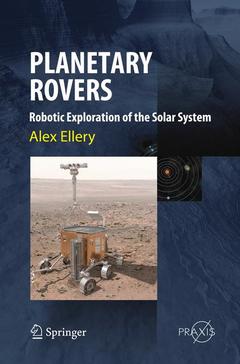Description
Planetary Rovers, Softcover reprint of the original 1st ed. 2016
Robotic Exploration of the Solar System
Astronautical Engineering Series
Author: Ellery Alex
Language: English
Subjects for Planetary Rovers:
Publication date: 03-2018
Support: Print on demand
Publication date: 01-2016
702 p. · 15.5x23.5 cm · Hardback
Description
/li>Contents
/li>Biography
/li>Comment
/li>
The increasing adoption of terrain mobility ? planetary rovers ? for the investigation of planetary surfaces emphasises their central importance in space exploration. This imposes a completely new set of technologies and methodologies to the design of such spacecraft ? and planetary rovers are indeed, first and foremost, spacecraft. This introduces vehicle engineering, mechatronics, robotics, artificial intelligence and associated technologies to the spacecraft engineer?s repertoire of skills. Planetary Rovers is the only book that comprehensively covers these aspects of planetary rover engineering and more. The book:
? discusses relevant planetary environments to rover missions, stressing the Moon and Mars;
? includes a brief survey of previous rover missions;
? covers rover mobility, traction and control systems;
? stresses the importance of robotic vision in rovers for both navigation and science;? comprehensively covers autonomous navigation, path planning and multi-rover formations on other planets;
? introduces sample acquisition and autonomous science ? with an emphasis on astrobiology ? as the raison d?être of rover missions;
? presents a special case study on the exploration of Europa;
? discusses future rover concepts, including a brief exploration of the role of biomimetics.
Introduction.- Planetary environments.- Survey of past rover missions.- Rover mobility and locomotion.- Rover sensorimotor control systems.- Rover vision—fundamentals.- Rover vision—advanced capabilities.- Autonomous navigation—behaviors and architectures.- Autonomous navigation—self-localization and mapping (SLAM).- Rover path planning.- Robotic sample acquisition.- Onboard autonomous science.- Case study: Robotic exploration of Europa.- Future rover concepts.

